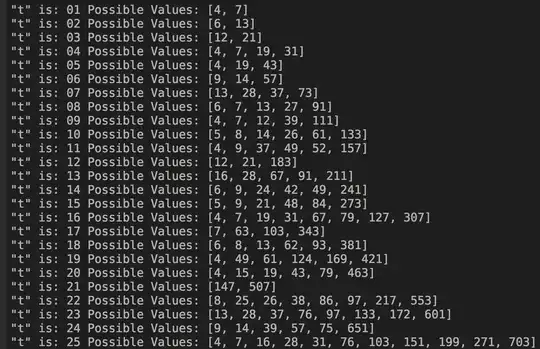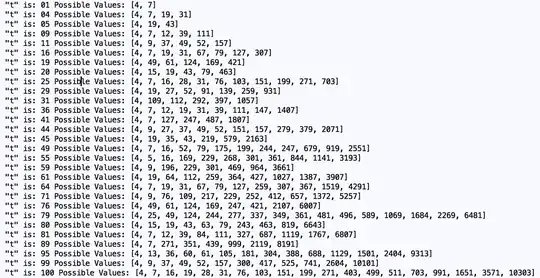TL;DR -
Is it true, and how should I prove that for all $t$ that can be expressed as $u^2+uv-v^2$ for some $u, v \in \Bbb{Z}$, $$\frac{x^2+xy+y^2}{xy-t} = 4$$ has a pair of solution $(x, y) \in \Bbb{N}^2$?
After reading this post, I have tried to generalize the question by replacing the $1$ in the denominator by $t$, i.e. on
$$\frac{x^2+xy+y^2}{xy-t} = c.$$
I focused on the different possible non-negative integer values for $c$ (for $x, y$ $\in$ $\Bbb{N}$). Then I run a 'tiny' computer search. Here's the result:
I observed that there is a lot of $4$s in the arrays, so I filtered them out:
So here is my result: when t is in the list below, $4$ is a possible value of $c$:
[1, 4, 5, 9, 11, 16, 19, 20, 25, 29, 31, 36, 41, 44, 45, 49, 55, 59, 61, 64, 71, 76, 79, 80, 81, 89, 95, 99]
Doing a simple OEIS search gives us the sequence A031363.
And checking for all values in the OEIS sequence up to 10k, they all give $4$ as a possible value for $c$.
So here is my question after all the nonsense story:
Is it true, and how should I prove that for all $t$ that can be expressed as $u^2+uv-v^2$ for some $u, v \in \Bbb{Z}$, $$\frac{x^2+xy+y^2}{xy-t} = 4$$ has a pair of solution $(x, y) \in \Bbb{N}^2$?
(This is actually not proven to be true, so I am here to conjecture this.)
Thanks for reading, any tips or hints would be greatly appreciated!
Related: Number written in both forms (Also by me)

